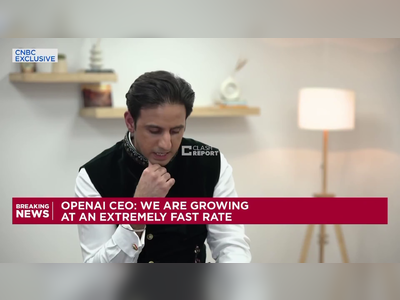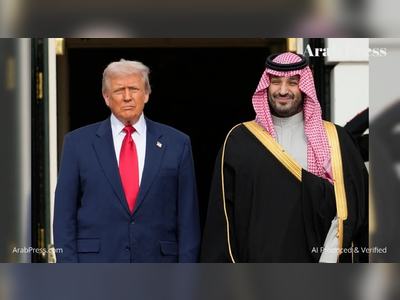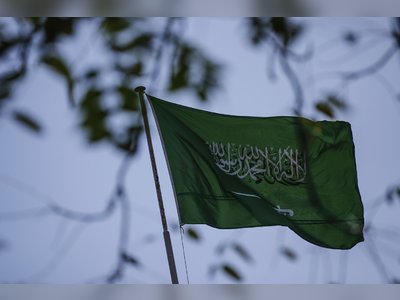
Pope Benedict was first pontiff to resign in 600 years
Benedict, the first German pope in 1,000 years, had good relations with his successor, Pope Francis, but his continued presence inside the Vatican after he stepped down in 2013 further polarised the Church ideologically.
Conservatives alarmed by Francis' progressive moves looked to Benedict as the guardian of tradition. Several times he had to tell nostalgic admirers via visitors: "There is one pope, and it is Francis."
A piano-playing professor and formidable theologian, Benedict was by his own admission a weak leader who struggled to impose himself on the opaque Vatican bureaucracy and stumbled from crisis to crisis during his eight-year reign.
Benedict repeatedly apologised for the Church's failure to root out sexual abuse of children by clergy, and although he was the first pope to take serious action against abuse, the efforts failed to halt a rapid decline in church attendance in the West, especially in Europe.
In 2022, an independent report in his native Germany alleged that Benedict had failed to take action in four abuse cases when he was Archbishop of Munich between 1977-1982.
Shaken by the report, he acknowledged in an emotional personal letter that errors had occurred and asked for forgiveness. His lawyers argued in a detailed rebuttal that he was not directly to blame.
Victims groups said the couched response squandered an opportunity from a scandal that rattled the Church worldwide.
Benedict will be best remembered for shocking the world on Feb. 11, 2013, when he announced in Latin that he was resigning, telling cardinals he was too old and frail to lead an institution with more than 1.3 billion members.
It was always going to be tough following his charismatic predecessor Pope John Paul II, who died in 2005, and Benedict admitted to difficulties in an emotional farewell.
"There were moments of joy and light, but also moments that were not easy ... There were moments ... when the seas were rough and the wind blew against us and it seemed that the Lord was sleeping," Benedict told his last general audience, a gathering of more than 150,000 people.
The Seat of St Peter was declared vacant on Feb. 28, 2013, when Benedict took up residence at the papal summer retreat at Castelgandolfo, south of Rome, while cardinals from around the world gathered in the Vatican to choose his successor.
POPE EMERITUS
Before he formally stepped down, Benedict and his aides unilaterally chose the title "pope emeritus" and decided he would continue to wear a white cassock, albeit a slightly modified one.
Some in the Church balked, saying he left his successor's hands tied. They said he should have returned to being a cardinal or a priest dressed in red or black.
After the election of Pope Francis on March 13, Benedict moved into a converted convent on the Vatican grounds to spend his final years in prayer, reading, playing the piano and receiving friends.
He appeared in public rarely, usually for major Church ceremonies, though he made an emotional visit in June 2020 to his ailing elder brother Georg, a priest, in Bavaria. Georg died shortly afterwards, aged 96.
Although he said he would remain "hidden from the world", Benedict did not live up to that promise and in retirement sometimes caused controversy and confusion through his writings.
In an essay for a Church magazine in Germany in 2019, he blamed the crisis over the abuse of children by priests on the effect of the 1960s sexual revolution, what he called homosexual cliques in seminaries and a general collapse in morality.
Critics accused him of trying to shift the blame away from the hierarchy of the institutional Church. But it was music to the ears of conservatives, who rallied to his defence.
The confusion over Benedict's role came to a head in January 2020 over the extent of his involvement in a book written by a conservative cardinal that some saw as an attempt to influence a document Pope Francis was preparing.
It led to Francis dismissing Archbishop Georg Ganswein, Benedict's secretary, from a top Vatican job. Ganswein's role as a middleman between Benedict and the cardinal was unclear, with many believing he had misled Benedict, the cardinal, or both.
The episode brought calls by some Vatican officials for clear rules about the status of any future pontiff who resigns.
Francis has said that he would prefer the title Emeritus Bishop of Rome, as suggested by some, if he one day resigned. He has also said he would not live in the Vatican but in a home for retired priests in Rome.
GAFFES
An uncompromising conservative on social and theological issues, Benedict quite literally cloaked himself in tradition during his papacy, often donning fur-trimmed capes and red shoes in his public appearances - a stark contrast to the more humble, down-to-earth style of his successor.
He antagonised Muslims by appearing to suggest that Islam was inherently violent and angered Jews by rehabilitating a Holocaust denier. The gaffes and missteps culminated in 2012, when leaked papers revealed corruption, intrigue and feuding within the Vatican.
The "Vatileaks" case resulted in the arrest of his butler, Paolo Gabriele, who was convicted of handing secret documents to a journalist. Benedict later pardoned him. Gabriele was given a job in a Vatican-owned hospital and died in 2020.
Media speculated that the saga, which laid bare allegations of a lobby of gay clergy operating against the pope, might have pressured him to resign. Benedict insisted he stood down because he could no longer bear the full weight of the papacy, including the tiring international journeys the job demanded.
In a book-long interview published in 2016, he acknowledged his shortcomings but did not regard his papacy as a failure.
"One of my weak points is perhaps a lack of resolve in governing and in decision-taking. In reality I am more of a professor, a person who reflects and meditates on spiritual questions," Benedict said in the book, "Last Testament", by German journalist Peter Seewald.
"Practical government is not my strong point and that is certainly a weakness. But I cannot see myself as a failure."
'GOD'S ROTTWEILER'
He was born Joseph Aloisius Ratzinger on April 16, 1927, in the southern German village of Marktl, close to Austria.
As a teenager he was forcibly enrolled in the Hitler Youth during World War Two and was briefly held by the Allies as a prisoner of war, but he was never a member of the Nazi party.
"Neither Ratzinger nor any member of his family was a National Socialist," John Allen, a leading expert on the Church, wrote in a biography of Benedict.
Ratzinger became a priest in 1951 and gained attention as a liberal theological adviser at the Second Vatican Council, which opened in 1962 and led to a profound reform of the Church.
However, the Marxism and atheism of the 1968 student protests across Europe prompted him to become more conservative to defend the faith against growing secularism.
After stints as a theology professor and then Archbishop of Munich, Ratzinger was appointed in 1981 to head the Congregation for the Doctrine of the Faith (CDF), the successor office to the Inquisition, where he earned the epithet "God's Rottweiler".
He and Pope John Paul agreed that traditional doctrine had to be restored in the Church after a period of experimentation.
Ratzinger first turned his attention to the "liberation theology" popular in Latin America, ordering the one-year silencing in 1985 of Brazilian friar Leonardo Boff, whose writings were attacked for using Marxist ideas.
In the 1990s, Ratzinger brought pressure against theologians, mostly in Asia, who saw non-Christian religions as part of God's plan for humanity.
A 2004 document by Ratzinger's office denounced "radical feminism" as an ideology that undermined the family and obscured the natural differences between men and women.
As pope from 2005, Benedict sought to show the world the gentler side of his nature, but he never achieved the "rock star" status of John Paul or appeared particularly comfortable in the job.
SCANDALS
Child abuse scandals hounded most of his papacy. He ordered an official inquiry into abuse in Ireland, which led to the resignation of several bishops. But the Vatican's relations with once devoutly Catholic Ireland plummeted during his papacy. Dublin shut its embassy to the Holy See in 2011.
Victims demanded he be investigated by the International Criminal Court. The Vatican said he could not be held responsible for the crimes of others and the court decided not to take up the case.
In September 2013, he denied that he had hushed up the scandals. "As far as you mentioning the moral abuse of minors by priests, I can only, as you know, acknowledge it with profound consternation. But I never tried to cover up these things," he said in a letter to Italian author Piergiorgio Odifreddi.
Benedict visited his homeland three times as pope and confronted its dark past when he visited the Nazi death camp at Auschwitz in Poland. Calling himself "a son of Germany", he prayed and asked why God was silent when 1.5 million victims, most of them Jews, died there during World War Two.
One trip to Germany also prompted the first major crisis of his pontificate. In a university lecture in 2006 he quoted a 14th century Byzantine emperor as saying Islam had only brought evil to the world and that it was spread by the sword.
After protests that included attacks on churches in the Middle East and the killing of a nun in Somalia, the pope said he regretted any misunderstanding the speech had caused.
In a move widely seen as conciliatory, he made a historic trip to predominantly Muslim Turkey later that year and prayed in Istanbul's Blue Mosque with the city's grand mufti.
The pope made a trip to the United States in 2008 where he apologised for the sexual abuse scandal, promised that paedophile priests would have to go and comforted abuse victims.
But in 2009 Benedict made one misstep after another.
The Jewish world, and many Catholics, were outraged after he lifted the excommunication of four traditionalist bishops, one of whom was a notorious Holocaust denier. Benedict later said the Vatican should have researched him better.
Jews were offended again in December 2009 when he restarted the process of putting his wartime predecessor Pius XII, accused by some Jews of turning a blind eye to the Holocaust, back on the road to sainthood after a two-year pause for reflection.
The pope prompted international dismay in March 2009, telling reporters on a plane taking him to Africa that the use of condoms in the fight against AIDS only worsened the problem.
APPOINTMENTS
At the Vatican, he preferred to appoint men he trusted and some of his early appointments were questioned.
He chose Cardinal Tarcisio Bertone, who had worked with him for years in the Vatican's doctrinal office, to be secretary of state, even though Bertone had no diplomatic experience. Bertone was later caught up in a financial scandal over the refurbishing of his Vatican apartment.
Benedict supported Christian unity but other religions criticised him in 2007 when he approved a document that restated the Vatican position that non-Catholic Christian denominations were not full churches of Jesus Christ.
Critics saw his papacy as a concerted drive to turn back the clock on reforms of the 1962-1965 Second Vatican Council, which modernised the Church in sometimes turbulent ways.
Benedict recast some Council decisions to bring them more in line with traditional practices such as the Latin Mass and highly centralised Vatican rule.
One of the themes he often returned to was the threat of relativism, rejecting the concept that moral values were not absolute but relative to those holding them and the times they lived in.
Benedict wrote three encyclicals, the most important form of papal document, including the 2007 "Spe Salvi" (Saved by Hope), an attack on atheism. The 2009 "Caritas in Veritate" (Charity in Truth) called for a rethink of the way the world economy is run.
Despite the difficulties that emerged from having two men wearing white in the Vatican, Francis developed a warm relationship with the man who was once nicknamed "the Panzer Cardinal" and said it was like having a grandfather in the house.
"He speaks little ... but with the same profundity as before," Francis once said.











